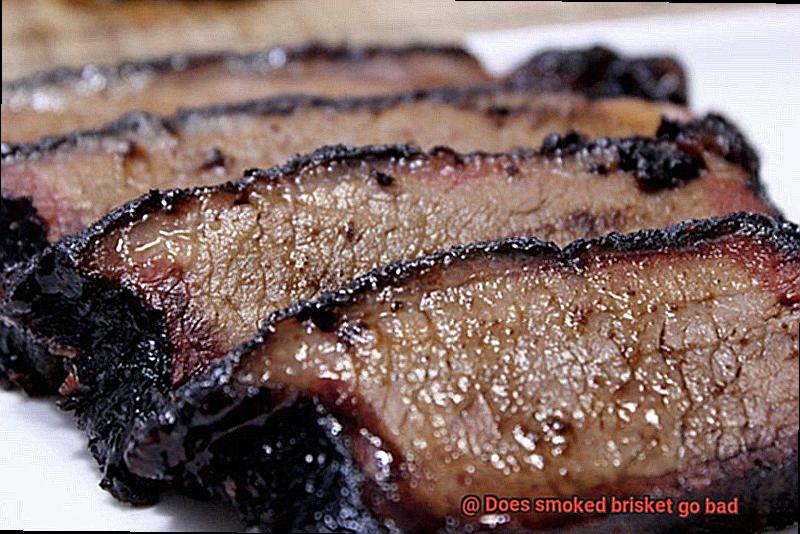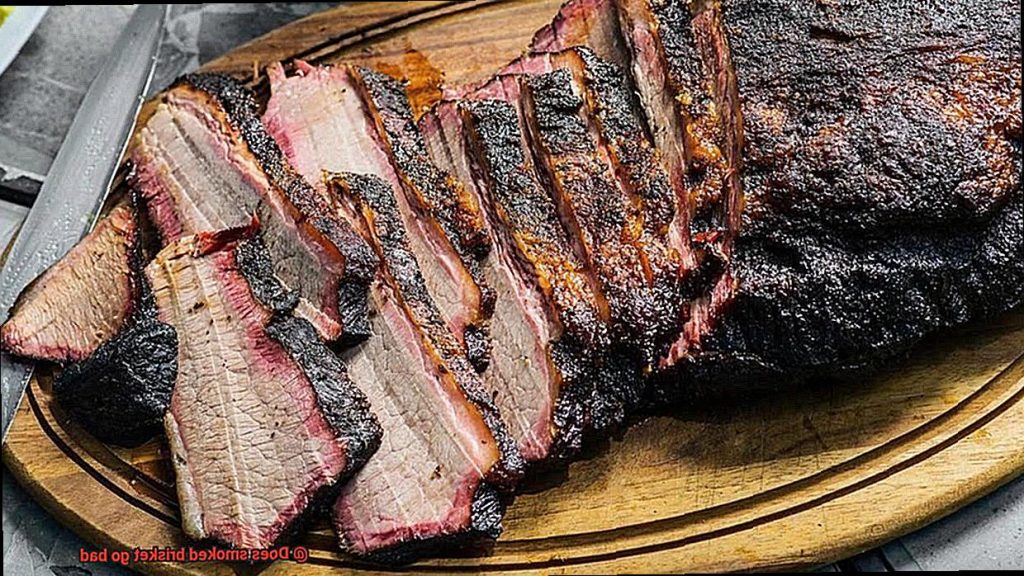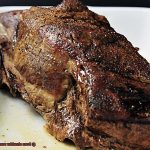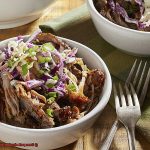If you’re like me, a true BBQ enthusiast, then you know that smoked brisket is the holy grail of meats. Its unique flavor and tender texture make it a staple in American cuisine, and it’s no wonder why. But what happens when you’ve got leftovers or want to store some for later? The question arises: does smoked brisket go bad?
Let me tell you, as a self-proclaimed brisket expert, that yes – smoked brisket can indeed spoil just like any other food. However, the speed at which it will go bad depends on several factors such as storage conditions, temperature, and time. With its high fat content, brisket is particularly susceptible to spoilage and can even turn rancid if not stored correctly.
In this blog post, we’ll cover everything you need to know about smoked brisket – from proper storage techniques to signs of spoilage and how long it’s good for. We’ll also share some tips on reheating your leftover brisket safely without sacrificing taste.
Whether you’re an experienced pitmaster or just someone who loves a good BBQ meal, this post is for you. So sit back and get ready to learn all about keeping your delicious smoked brisket fresh and safe for consumption.
Contents
What is Smoked Brisket?
Its tender and juicy texture, infused with smoky flavor, makes it a popular choice for backyard cookouts, family gatherings, and restaurants specializing in barbecue cuisine. In this article, we will explore what smoked brisket is, how it’s made, and how to store it properly to avoid spoilage.
What is Smoked Brisket?
Smoked brisket is a popular barbecue dish that originated in Texas but has gained popularity worldwide. It’s made from beef brisket that has been seasoned with a dry rub or marinade and then smoked over wood or charcoal for several hours. The slow cooking process allows the meat to absorb the smoky flavor from the wood or charcoal while breaking down the tough connective tissue in the brisket, resulting in a tender and juicy final product. Smoked brisket is often served sliced or chopped and accompanied by various sides such as coleslaw, cornbread, or baked beans.
How to Make Smoked Brisket
Making smoked brisket is an art that requires patience and attention to detail. To make smoked brisket, you’ll need a few essential tools such as a smoker, wood chips or chunks, and a meat thermometer. First, season the brisket with your favorite dry rub or marinade and let it sit for at least an hour to allow the flavors to penetrate the meat. Then, heat up your smoker to 225-250°F and add your wood chips or chunks. Place the brisket on the smoker and let it cook for several hours until it reaches an internal temperature of about 200-205°F. The cooking time depends on the size of the brisket; a rule of thumb is one hour per pound of meat. Once done, remove the brisket from the smoker and let it rest for about 30 minutes before slicing or chopping.
How to Store Smoked Brisket
How Long Does Smoked Brisket Last?
Smoked brisket is a masterpiece of flavors and aromas that can make your mouth water. But, how long does it last before it becomes unfit for consumption? Well, it depends on several factors like preparation, storage, and cooking method.

If you want to ensure that your smoked brisket lasts for up to four days in the refrigerator, you need to follow the right steps. Firstly, after smoking it for hours over wood or charcoal, wrap it tightly in plastic wrap or aluminum foil and store it in an airtight container. This will help prevent bacteria growth and air from getting in.
But what if you want to store your smoked brisket for longer than four days? In that case, freezing is the way to go. When properly frozen, smoked brisket can last for up to three months in the freezer. Make sure to wrap it tightly in plastic wrap or aluminum foil and place it in an airtight container or freezer bag. Don’t forget to label the package with the date of freezing.
One thing to keep in mind is that smoked brisket’s quality deteriorates over time, even if stored properly. The longer you keep it, the more likely it is to become dry and tough. To ensure its quality and flavor, try to eat your smoked brisket as soon as possible after cooking.
In summary, here are some tips to help your smoked brisket last longer:
- Store it in an airtight container or wrap it tightly in plastic wrap or aluminum foil.
- Keep it in the refrigerator for up to four days.
- Freeze it for up to three months.
- Label the package with the date of freezing.
- Eat it as soon as possible after cooking.
How to Store Smoked Brisket Properly
Here are five key tips to ensure your smoked brisket stays fresh and safe to eat:
Let the brisket cool down before storing
Putting hot meat in the fridge or freezer can cause bacterial growth and spoilage. Let your smoked brisket cool down to room temperature before storing it.
Wrap it tightly
Use plastic wrap or aluminum foil to cover the brisket tightly, preventing air from getting in and drying out the meat. Dryness can make your smoked brisket tough and unappetizing.
Choose the right storage container
Airtight containers or vacuum-sealed bags are the best options for storing smoked brisket. Vacuum-sealing removes air from the container, reducing oxidation and extending the meat’s shelf life.
Control the temperature
The ideal storage temperature for smoked brisket is between 32-40°F (0-4°C), which slows down bacterial growth and preserves the meat’s texture and flavor. Make sure your fridge or freezer is set to this range.
Consume within 3-4 days or freeze for long-term storage
Smoked brisket should be consumed within 3-4 days of storage in the fridge. You can also freeze it for up to six months without significant quality changes. When reheating, do it slowly at a low temperature to prevent drying out the meat.
What Happens When Smoked Brisket Goes Bad?
As a self-proclaimed smoked brisket connoisseur, I can tell you that nothing ruins the experience like biting into a piece of meat gone bad. Not only is it unappetizing, but it can also be hazardous to your health.
The first sign that your smoked brisket has taken a turn for the worse is the unmistakable stench. The odor is sour and rancid, and it’s enough to make even the most dedicated carnivore lose their appetite. But the smell isn’t the only indication of spoilage. The texture of the meat changes too – it becomes slimy or sticky to the touch, and you may even notice discoloration or mold.
Several factors can contribute to the spoilage of smoked brisket. Improper storage is a common culprit. If you store your smoked brisket in an area that’s too warm or humid, bacteria can easily contaminate the meat, leading to spoilage. Also, leaving smoked brisket in the fridge for too long increases its chances of going bad.
Eating spoiled brisket can lead to food poisoning, which can cause nausea, vomiting, diarrhea, and stomach cramps. It’s essential to seek medical attention if you experience any of these symptoms after eating bad brisket.
To avoid all of these unpleasant outcomes, you should store smoked brisket properly. Keep it in an airtight container in either the refrigerator or freezer, and always ensure that it’s cooked thoroughly before eating. If you’re unsure whether your smoked brisket has gone bad, don’t take any chances – throw it out.
Tips for Keeping Smoked Brisket Fresh
Smoked brisket is a dish that requires time and effort to prepare. Therefore, it’s crucial to store it properly and keep it fresh for days after cooking. Here are some tips to make sure your smoked brisket remains delicious:
Proper Storage
Once the smoking process is complete, let the brisket rest for at least 30 minutes before slicing it. This allows the juices to redistribute throughout the meat and ensures that it stays moist. After resting, wrap the brisket tightly in aluminum foil or butcher paper to prevent air exposure. You can also vacuum seal it if you plan on storing it for an extended period of time.
Safe Temperature
Keeping the smoked brisket at a safe temperature is important when storing or transporting it. Refrigerate it immediately after smoking, and make sure to store it at 40°F or below to prevent bacterial growth. When transporting the brisket, use a cooler with ice packs or frozen gel packs to keep it cold.
Reheating Properly
When reheating smoked brisket, slow and low is the way to go. Avoid using high temperatures as this will dry out the meat and make it tough. Instead, place the brisket in a covered dish with a small amount of liquid such as beef broth, which will help keep it moist while reheating. Make sure that the internal temperature reaches at least 165°F before eating to kill any bacteria that may have grown while stored.
Timeframe
Smoked brisket is best consumed within 3-4 days after being cooked. If you’re not planning on consuming it within this timeframe, freezing is an excellent option. Wrap your brisket tightly in plastic wrap and then aluminum foil or butcher paper to avoid freezer burn.
Freezing
Freezing smoked brisket helps extend its shelf life for up to six months, ensuring that you can enjoy it long after its initial preparation. When you’re ready to eat it, thaw it in the refrigerator overnight before reheating.
Troubleshooting Common Issues with Smoked Brisket
With my guidance, you’ll be able to troubleshoot like a pro and overcome any issues that may arise.
First and foremost, proper storage is crucial in preventing spoilage of your smoked brisket. If it is not stored correctly or left at room temperature for too long, it can go bad. To avoid this issue, store it in an airtight container or wrap it tightly in foil or plastic wrap before placing it in the refrigerator for up to 4 days or in the freezer for up to 6 months. Make sure to discard the meat immediately if you notice any signs of spoilage, such as an off odor or slimy texture.
Another common issue with smoked brisket is that it can become tough and dry if it is overcooked. This can happen if the internal temperature of the meat gets too high, causing the proteins in the meat to break down and become tough. To avoid this issue, use a meat thermometer to monitor the internal temperature of the meat. Once it reaches an internal temperature of around 195-205°F, remove it from the smoker and wrap it tightly in foil or butcher paper. Let it rest for at least an hour before slicing. This will allow the juices to redistribute throughout the meat, resulting in a juicy and tender brisket.
A bitter or acrid taste can also be a problem when smoking brisket. This is often caused by too much smoke or smoking for too long. Creosote can build up on the surface of the meat, giving it a bitter taste. To avoid this issue, use a moderate amount of smoke and smoke the brisket for no more than 6-8 hours. You can also try wrapping the brisket in foil or butcher paper after a few hours to limit the amount of smoke exposure.
Is It Safe to Eat Spoiled Smoked Brisket?
If so, you know that there’s nothing quite like a perfectly cooked cut of meat. However, what happens when your beloved brisket goes bad? Is it still safe to eat? As a specialist in this field, I can tell you that consuming spoiled smoked brisket can be a risky business.
First things first, let’s talk about what spoilage actually means. Spoilage occurs when bacteria and other microorganisms start to grow on the meat, causing it to develop an off taste, smell, or texture. Although smoking meat can enhance its flavor and prolong its shelf life, it does not make it immune to spoilage. Eating spoiled smoked brisket can lead to food poisoning, which can have severe health consequences.
The symptoms of food poisoning – nausea, vomiting, diarrhea, stomach cramps, and fever – are not pleasant. In severe cases, it can even lead to hospitalization or death. So it’s essential to make sure your smoked brisket is fresh and safe to eat before you tuck in.
To determine if your smoked brisket has gone bad, there are several things to look out for. First and foremost, check for an unusual odor or slimy texture. Any discoloration or mold growth on the meat is also a clear sign that it should not be consumed. Additionally, checking the temperature of the meat before eating is crucial. Leaving it out at room temperature for an extended period or failing to store it correctly in the fridge or freezer can cause harmful bacteria to grow.
Proper handling and storage of smoked brisket are essential to ensure that it remains safe to eat. If you suspect that your smoked brisket has gone bad, then it’s better to be safe than sorry and throw it away rather than risking food poisoning.
How to Tell if Your Smoked Brisket Has Gone Bad
Here are five ways that will help you determine if your smoked brisket is still safe to eat.
Texture Check
One of the most important indicators of spoiled meat is its texture. If your smoked brisket feels slimy or sticky to the touch, it has likely developed harmful bacteria and should be discarded immediately. On the other hand, if it feels dry and tough, it may have been overcooked and lost its flavor and tenderness.
Smell Test
Another way to tell if your smoked brisket has gone bad is by using your sense of smell. While a smoky aroma is expected, if you detect a sour or rancid smell, it’s a clear indication that the meat has spoiled. Trust your nose and don’t take any chances with your health.
Appearance Check
A visual inspection can also reveal whether or not your smoked brisket has gone bad. Look for any discoloration or mold growth on the surface of the meat. Even if the rest of it looks okay, any signs of mold or other abnormalities should be taken seriously and not eaten.
Storage Conditions
Proper storage is essential in preventing your smoked brisket from going bad. Always store it in airtight containers or wrap it tightly in cling film before refrigerating or freezing. Leaving it out at room temperature for an extended period of time increases the risk of harmful bacteria growth.
Use Your Judgment
When in doubt, use your best judgment when deciding whether or not to eat leftovers. If you have any doubts about its safety, it’s always best to err on the side of caution and throw it out. Don’t take any risks with your health.
8Er9Hdnd50Q” >
Conclusion
In conclusion, smoked brisket is a mouth-watering BBQ delicacy that demands proper handling and storage to avoid spoilage. As a self-proclaimed brisket aficionado, I can confirm that smoked brisket can go bad if not stored correctly. The speed at which it spoils depends on several factors such as storage conditions, temperature, and time. With its high fat content, brisket is particularly vulnerable to spoilage and can even turn rancid if not stored appropriately.
To keep your smoked brisket fresh and safe for consumption, it’s crucial to store it properly. You can use airtight containers or wrap it tightly in plastic wrap or aluminum foil before refrigerating or freezing. The ideal storage temperature for smoked brisket is between 32-40°F (0-4°C), which slows down bacterial growth and preserves the meat’s texture and flavor.
When reheating your leftover brisket safely without compromising taste, do it slowly at a low temperature to prevent drying out the meat. Ensure that the internal temperature reaches at least 165°F before eating to kill any bacteria that may have grown while stored.
If you suspect that your smoked brisket has gone bad, then it’s better to be safe than sorry and dispose of it rather than risking food poisoning. Proper handling and storage of smoked brisket are vital to ensure that it remains safe to eat.






